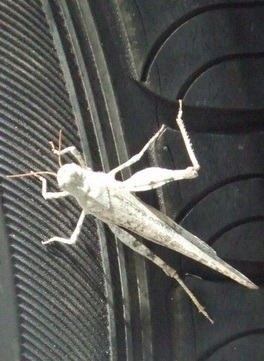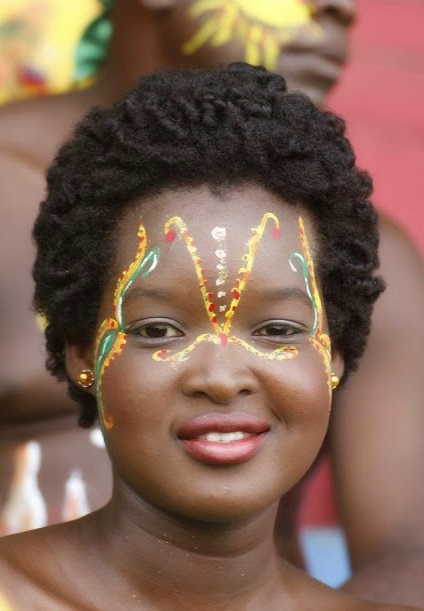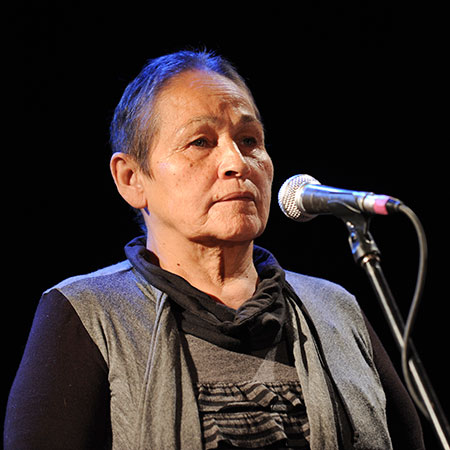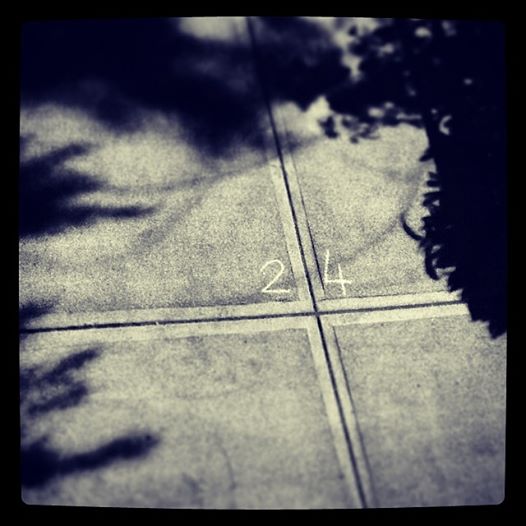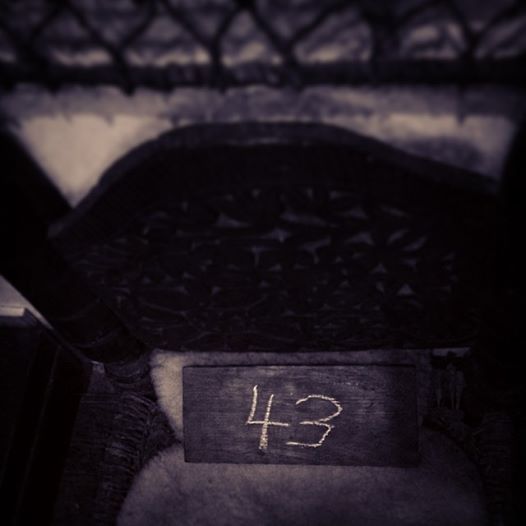“Es algo tan muy nuevo”: versiones de poemas por e.e.cummings – con gouaches de William Gilpin-Beck / “It is so quite new a thing”: poems of e.e.cummings in Spanish translations – with gouaches by William Gilpin-Beck
Posted: July 31, 2014 Filed under: E.E. Cummings, English, Spanish, ZP Translator: Alexander Best Comments Off on “Es algo tan muy nuevo”: versiones de poemas por e.e.cummings – con gouaches de William Gilpin-Beck / “It is so quite new a thing”: poems of e.e.cummings in Spanish translations – with gouaches by William Gilpin-Beck. . .
e.e.cummings (1894-1962, Cambridge, Massachusetts, USA)
i like my body when it is with your
.
i like my body when it is with your
body. it is so quite new a thing.
Muscles better and nerves more.
i like your body. i like what it does,
i like its hows. i like to feel the spine
of your body and its bones,and the trembling-
firm-smooth ness and which i will
again and again and again
kiss, i like kissing this and that of you,
i like,slowly stroking the,shocking fuzz
of your electric fur,and what-is-it comes
over parting flesh….And eyes big love-crumbs,
and possibly i like the thrill
of under me you so quite new
.
(from cummings’ 1925 collection, &[AND])
. . .
e.e.cummings
(1894-1962, poeta estadounidense innovador, nacido en Cambridge, Massachusetts)
me gusta mi cuerpo cuando al tuyo (1925)
.
me gusta mi cuerpo cuando al tuyo está junto.
es algo tan muy nuevo.
Músculos mejores y nervios más.
me gusta tu cuerpo. me gusta lo que hace,
y su cómo. me gusta tocar el espinazo
de tu cuerpo y sus huesos,y el temblor
-resuelto-lisura,que,
una y otra vez,
besaré, me gusta besar tu esto y tu eso,
me gusta, lentamente acariciar, el vello estremecedor
de tu pelaje eléctrico, y lo-que-es viene
sobre la raya abierta de tu carne viva. . . . Y ojos grandes-sobras de amor,
y me gusta, posiblemente, la incitación de
bajo el mí la tú tan muy nueva
. . .
since feeling is first
.
since feeling is first
who pays any attention
to the syntax of things
will never wholly kiss you;
wholly to be a fool
while Spring is in the world
my blood approves,
and kisses are a better fate
than wisdom
lady i swear by all flowers. Don’t cry
– the best gesture of my brain is less than
your eyelids’ flutter which says
we are for each other: then
laugh, leaning back in my arms
for life’s not a paragraph
And death i think is no parenthesis
.
(from cummings’ 1926 collection, is 5)
. . .
porque está primero el sentimiento (1926)
.
porque está primero el sentimiento
quien ponga atención
a la sintaxis de las cosas
nunca te besará, plenamente;
plenamente ser un bobo
mientras la Primavera está en el mundo
mi sangre aprueba,
y son un mejor destino, los besos,
que la razón
señora tengo plena confianza en todas las flores. No llores
– el mejor gesto del seso es menos que
el revuelo de tus párpados que dice que
somos el uno para el otro; pues
ríe, reclínate en mis brazos
porque no es un párrafo la vida
Y yo creo que la muerte no es ningún paréntesis
. . .
may i feel said she
.
may i feel said he
(i’ll squeal said she
just once said he)
it’s fun said she
(may i touch said he
how much said she
a lot said he)
why not said she
(let’s go said he
not too far said she
what’s too far said he
where you are said she)
may i stay said he
(which way said she
like this said he
if you kiss said she
may i move said he
is it love said she)
if you’re willing said he
(but you’re killing said she
but it’s life said he
but your wife said she
now said he)
ow said she
tiptop said he
don’t stop said she
oh no said he)
go slow said she
(cccome?said he
ummm said she)
you’re divine!said he
(you are Mine said she)
.
(from cummings’ 1935 collection, No Thanks)
. . .
puedo tocarte dijo él (1935)
.
dijo él: puedo tocarte
(dijo ella: chillaré
dijo él: sólo una vez)
dijo ella: es redivertido
(puedo palparte
cuánto
mucho)
por qué no
(vámonos dijo él
no demasiado dijo ella
qué es demasiado lejos
donde tu estás)
(puedo quedarme dijo él
cómo dijo ella
así dijo él
si me das un beso dijo ella
puedo moverme
es el amor)
si lo estás deseando
(pero me estás matando
él dijo: pero la vida es así
ella dijo: pero y tu mujer
él dijo: ahora)
ella dijo: ayy
súper dijo él
no te detengas dijo ella
ay no dijo él)
más despacio dijo ella
(¿te corres?
mmm)
¡eres divina!
(eres Mío…)
love is more thicker than forget
.
love is more thicker than forget
more thinner than recall
more seldom than a wave is wet
more frequent than to fail
it is most mad and moonly
and less it shall unbe
than all the sea which only
is deeper than the sea
love is less always than to win
less never than alive
less bigger than the least begin
less littler than forgive
it is most sane and sunly
and more it cannot die
than all the sky which only
is higher than the sky
.
(from cummings’ 1940 collection, 50 Poems)
. . .
amar es más denso que olvidar (1940)
.
amar es más denso que olvidar
más fino que recordar
más raramente que una ola mojada
más frecuente que fracasar
es más loco y lunarmente
y menos no será
que todo el mar que sólo
es más hondo que la marejada
el amor es menos siempre que ganar
menos nunca que viviente
menos grande que un comienzo que es lo mínimo
menos pequeño que perdón
es el más sensato y del sol (sol a mente)
y encima no puede morir
que todo el azul que sólo
es más alto que el cielo
. . .
i carry your heart with me
.
i carry your heart with me(i carry it in
my heart)i am never without it(anywhere
i go you go,my dear,and whatever is done
by only me is your doing,my darling)
i fear
no fate(for you are my fate,my sweet)i want
no world(for beautiful you are my world,my true)
and it’s you are whatever a moon has always meant
and whatever a sun will always sing is you
here is the deepest secret nobody knows
(here is the root of the root and the bud of the bud
and the sky of the sky of a tree called life;which grows
higher than soul can hope or mind can hide)
and this is the wonder that’s keeping the stars apart
i carry your heart(i carry it in my heart)
.
(from cummings’ 1958 collection, 95 Poems)
. . .
llevo tu corazón conmigo (1958)
.
llevo tu corazón conmigo, (lo llevo en mi corazón), sin él nunca estoy
(a donde quiera que voy vas tú mi amor;
y donde aquello que hago yo sola
es gracias a tí, mi cielo.)
no tengo miedo
del destino
(porque eres mi destino, cariño).no quiero ningún mundo porque hermosa
eres, mi mundo, mi verdad) y tú eres lo que es el siempre-significado de una luna y lo que cantará siempre el sol eres tú
este es el secreto más profundo y desconocido
(Acá está la raíz de la raíz
y el brote del brote
y el cielo del cielo de un árbol llamado vida;
que crece más alto de lo que el alma pueda esperar o la mente ocultar)
y esto es la maravilla que mantiene las estrellas separadas
llevo tu corazón, (lo llevo en mi corazón)
Edward Estlin Cummings (1894-1962) was an American poet and painter who grew up with the core values of New England Transcendentalism. Known for his broken syntax and a deliberate and playful mis-use of parentheses, commas, periods and lower-case letters, he was one of the modernizers of poetic language – wrenching it away from 19th century verse conventions. His 1917 poem Buffalo Bill’s defunct (based on a newspaper headline) signaled that clean break with the past. In 2014, more than a half century after his death, Cummings’ lustre has faded; his once-astonishing word games now seem less exciting when text messages and ‘tweets’ bring us fractured language daily. Joyce Kilmer’s sentimental Trees (1914) and Langston Hughes’ subtle and provocative A Dream Deferred (1951) are today far more often memorized and quoted than any verses by e.e.cummings. Yet at the time of his death, Cummings – along with Robert Frost – was the most widely read of American contemporary poets.
All of the above poems are here featured in their original lay-outs, and are taken from the 1994 centennial edition of E.E. Cummings: Complete Poems 1904-1962, edited by George J. Firmage, published by Liveright, New York City.
. . .
Edward Estlin Cummings (1894-1962) fue un poeta, pintor, ensayista y dramaturgo. Aunque él no aprobaba la práctica, sus editores frecuentemente escribían su nombre con minúsculas para representar su sintaxis extraordinaria. Cummings es conocido por sus poemas que rompen con toda estructura – incluyendo usos poco ortodoxos de las mayúsculas y la puntuación, en la que los puntos y comas podían incluso llegar a interrumpir oraciones y hasta palabras. Sus poemas también están escritos sin respeto a los renglones y los párrafos y algunos no parecen tener pies ni cabeza hasta que no son leídos en voz alta. A pesar del hecho que utilizó los estilos vanguardistas y la tipografía inusual, la buena parte de su obra es tradicional; su poesía frecuentemente trata el tema del Amor.
. . . . .
Sichtbar: e.e.cummings auf Deutsch / Silence: e.e.cummings in German
Posted: July 31, 2014 Filed under: E.E. Cummings, English, German Comments Off on Sichtbar: e.e.cummings auf Deutsch / Silence: e.e.cummings in Germanstille
.ist
ein
shauender
vogel:der
wen
de;punkt,des
lebens
(suchend vor schnee
. . .
silence
.is
a
looking
bird:the
turn
ing;edge,of
life
(inquiry before snow
. . .
schnee heisst das
leben ist eine schwarze kannonad
e indie still
e go
ttllow
eg-weg)leben
?
baum3geister
sind Is 1 A ugen
Seltsam
vertraut
Gesicht
(warumlachend!unter:himmelsdiamanten
. . .
snow means that
life is a black cannonadin
g into silenc
e go
lliw
og-dog)life
?
tree3ghosts
are Is A eyes
Strange
known
Face
(whylaughing!among:skydiamonds
. . .
n
Ichtdl
n
gkann u
c
berTReff
e
n das
m
YsteriU
m
des
s
tilL.Sein
s
. . .
n
Othl
n
g can
s
urPas
s
the m
y
SteR
y
of
s
tilLnes
s
. . .
Wunderschön
ist das
unbe
deuten
des(lei
se)fal
lenden(da
nun
hier
all)s
chne
Es
. . .
Beautiful
is the
unmea
ning
of(sil
ently)fal
ling(e
ver
yw
here)s
Now
. . .
dies’ menschen herz
ist treu seiner
erde;so
jedermann’s welt
in
-t’ressiert ihn nicht(vom aus
sehen
anfühlen geschmack geruch
& klang
einer stille wer kann
ahnen
ge-
nau
was leben
tun wird)liebt
nichts
so serh so
wie(erst
das anko
-m-
me
-n)eine shneefloke tan-
zt
,auf
ihrem weg zum nie
-hier
r-f-e-p-u-e-h-s-a-g-r
welcher
al)s w(ir schau)en
aufnunrichht
PFEGERURASH
endz(u-
mDer):s
pr
iU
!ng:
T a
(n
kOmMeNd .gRrEaFsPuEh)
um
wieder(zu)ord(were)nen(en)d
,grashuepfer;
r-p-o-p-h-e-s-s-a-g-r
who
a)s w(e loo)k
upnowgath
PPEGORHRASS
eringint(o-
aThe):l
eA
!p:
S a
(r
rivinG .gRrEaPsPhOs)
to
rea(be)rran(com)gi(e)ngly
,grasshopper;
. . .
All e.e.cummings German translations © 2003, from the volume Sichtbar-Silence: Cummings coming into German, edited by Gudren M. Grabher
. . . . .
Ana María Caballero: Nuevos Poemas
Posted: July 29, 2014 Filed under: Ana María Caballero, Spanish Comments Off on Ana María Caballero: Nuevos Poemas
Ana Maria Caballero reading her poems in Roldanillo, Valle del Cauca, Colombia_La poeta leyendo sus poemas en Roldanillo, Valle, Colombia
La librería que recomendaste
Abierta a las 7 y 25 de la noche
Lunes
Mucha luz y 0 ruido, 2 libros de brujería moderna
Lunes
1 de pensamiento árabe, todos 3 en rebaja
Lunes
8 días después de dejarme un
Domingo
Después de 2 noches
Domingo
Los 2 creyendo que llamarías
Martes
1 noche a
Miércoles
Crear 1 noche
Jueves
Para sumar a las 2 noches
Viernes
Abierta tu librería a las 7 y 25
Lunes
Luz, 0 ruido, 3 libros
Lunes
2 noches, un
Lunes
0
ruido
. . .
Sí mi patrón
El patrón me llevó a su cuarto de patrón –
mesa, poltrona, balcón y hamaca.
Con el patrón yo la patrona –
palma plateada entre mi pueblo y mi puerta.
Desde el ron en la sangre cada paso su paso –
baldosa floreada un mapa de geometría opaca.
Al iniciar convidó pijama y enseres de higiene –
grueso cajón desnuda las herramientas.
Adentro cuento sombreros colgados –
afuera sopla la brisa y seca las sábanas limpias.
. . .
Te lo vi
Yo lo vi; te lo vi todo.
Te vi mi mano abriendo y cerrando
el cuero de un libro pesado.
Te vi mi mano mostrando y tapando
el reflejo de un tenedor bordado.
Te vi mi piel guardada.
Te vi la falta de crucifijos
en las paredes de mi casa.
Te vi la falta de edificios
en la vista de mi ventana.
Te vi mi perfil de florero recién lavado.
Te vi mi postura al montar a caballo,
con brinco discreto de buena equitación.
Te vi mis lenguajes clásicos y lejanos,
con sílabas que resuenan su larga educación.
Te vi mi tacón alto como si fuera guante blanco.
Yo lo vi; yo sé que se lo vi:
en el centro puro de su ojo oscuro
le vi mi ojo verde,
despedido por su merced.
. . .
Ahora se espera
Ahora no se quiere. Se espera.
Ahora no se mira, ahora no se toca.
Ahora se espera.
Ahora se piensa, se imagina, se calla.
Se ignora, se ocupa, se excusa.
Aunque se sepa, se sienta, se vea,
ahora se calla.
Aunque se piense, se imagine, se implore,
ahora se calla.
No se busca, se inventa.
Se aguanta.
Y no se cuenta.
. . .
Ana Maria Caballero has worked in the financial sector, as a journalist, for a wine importation company – even for the government of Colombia. Recently she became a mother, and now focuses her attention on writing poetry and literary commentary – what she calls “book thoughts”. These may be read at http://www.thedrugstorenotebook.co.
Her writing has appeared in numerous publications: Elephant Journal, CutBank, Aviary Review, Really Systems, Ghost House Review, Dagda Publishing, and Toasted Cheese Literary Journal.
Visit Zeteo Journal to read her weekly poetry feature in the Zeteo is Reading column:
http://www.zeteojournal.com
. . . . .
Navia Magloire: 4 poèmes de la poétesse haïtenne
Posted: July 28, 2014 Filed under: French, Navia Magloire Comments Off on Navia Magloire: 4 poèmes de la poétesse haïtenneTournure
Je ne veux plus rêver des hommes
Cheminant le vent des caraïbes
Je préfère imaginer leurs ombres
qui s’aventurent dans le jardin de ma conscience
Je me fais entremetteuse d’un monde connu
et celui de l’ inconnu
Avec eux, je suis ruine déshonorant mes
parterres de parfum, de naturel et de quiddité
Sans eux, je suis fortune d’imagination, de sourire
et de spontanéité
Je ne veux plus penser aux hommes
menaces pandémiques d’une société
asociale
désormais je les invente au coup
d’éclair de ma raison conditionnée
Je me fais paraphrase du réel et de l’irréel
Pour eux, je suis bonne chair, gourmet, désir
Loin d’eux, je suis pensée, divine et immortelle
Je ne veux plus parler des hommes
Je désire les créer dans des fibres d’amour
qui transcende le virtuel et peut-être
qu’un de ces matins apparaîtra l’homme
que j’ai rêvé.
Agapè
Combien j’ai envie de m’abandonner
à la prière amère de mes larmes
car j’habite un corps dont l’amour a déserté
les carrefours dès la jeunesse du matin
Sans amen je cherche l’abri de mon ombre
sans merci il me fuit
j’habite un corps désert
un corps fantôme
un corps liquide
un corps pétrifié
Combien hélas j’ai envie de marcher dans
la mémoire glissante de mes larmes
Car j’habite une ville fumée
depuis la traversée impersonnelle
de mon corps en transit
Sans relâche je furète sa vividité
Sans relâche il se tait
j’habite un corps évaporé
un corps fumant
un corps dilué
un corps périmé
Je suis poussé à voyager
les remous de mes larmes
car je cherche au participe passé
l’Agapè d’un corps inédit.
Maux d’Eau
Il pleut des rivières dans ma tête
Mon île ne rêve plus
les voix du passé obnubilent son imaginaire
Il pleut des tempêtes dans ma tête
mon île a délaissé son rêve
ses troubadours décriés s’empoissent
dans la gabégie
Il pleut à verses dans ma tête
Mon île a gommé son rêve
les tambours de ses contes s’obstinent
dans l’amnésie
il pleut, il pleut des larmes dans ma tête
mon île ne rêve plus
la cohorte des dieux a déserté l’oraison
de ses rites
il pleut dans ma tête en eau
ses semences chaotiques ont perdu
leur impulsion
mon île est un immense vase
de pleurs
Elle a cessé de rêver, mon île !
Terre arc en ciel
Le tambour de Dahomay
s’est éteint à Vertières
son roulement subversif
travesti en furie
assassine ma terre Arc-en-ciel
je décèle dans un bourdonnement
un désir de rédemption
mais hélas !
Le tam-tam des Peuls
s’est immobilisé à la Citadelle
son souffle subversif
perverti en folie
dévoye l’esprit de la gente intellect
je découvre dans ce bourdonnement
un refrain de guérison
mais hélas !
Le son des cornes des Nagos
s’est tû à la Crête à Pierrot
son esprit subversif
annihilé par le tribalisme
obscurci la vision futuriste
de ma terre Arc-en-ciel
se dénoue dans ce bourdonnement
une aversion tribale
et
l’avenir se coagule.
Navia Magloire est née au Cap Haïtien, une commune d’Haïti. Elle a débuté sa scolarité de l’âge de 2 ans à Saint-Joseph de Cluny où elle a terminé ses études primaires et secondaires classiques. Elle a complété des études universitaires en science de l’éducation et de psychologie a UJPM (Université Jean Price-Mars). Durant un séjour aux Etats-Unis d’Amérique, elle a familiarisé elle-même avec la poésie d’Anthony Phelps, et plus tard de Saint-John Kauss, qui est devenue pour elle un exemple à suivre, et qui la pousse à considérer l’écriture comme un exutoire à sa revolte.
. . .
Nos remerciements au site web Potomitan (pour les poèmes), et à CTV-Montréal (pour les photos)
6 photographies du Carnaval des Fleurs, Haïti. Cette année le Carnaval se déroule du 27 au 29 juillet 2014.
“Nature Photography” by Laboni Islam
Posted: July 28, 2014 Filed under: English, Laboni Islam Comments Off on “Nature Photography” by Laboni Islam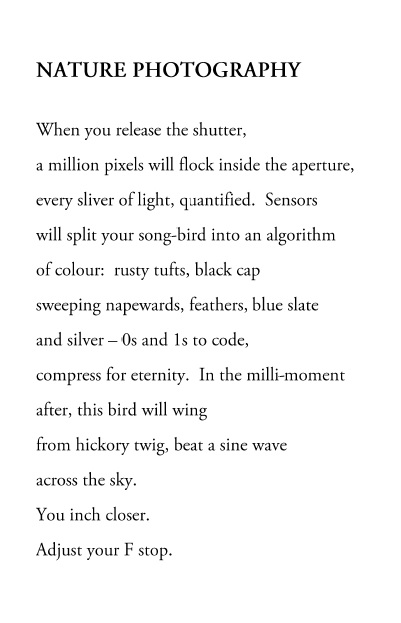
. . .
Before and After the Horizon: Anishinaabe Artists of the Great Lakes
Posted: July 25, 2014 Filed under: IMAGES | Tags: Anishinaabe Artists Comments Off on Before and After the Horizon: Anishinaabe Artists of the Great LakesA first-ever exhibition for the Art Gallery of Ontario in Toronto opens today: Before and After the Horizon: Anishinaabe Artists of the Great Lakes.
The Anishinaabe Peoples gave us many of the place names we use today in the Canadian province of Ontario:
Algonquin, Attawapiskat, Etobicoke, Gananoque, Kanata, Kapuskasing, Manitoulin, Mississauga, Niagara, Nipigon, Ontario, Oshawa, Ottawa, Penetanguishene, Petawawa, Temagami, Tyendinaga, Wasaga, Wawa, Wikwemikong.
Anishinaabeg have lived in the Great Lakes region for thousands of years – and include the Algonquin, Chippewa, Mississauga, Nipissing, Ojibwe, Odawa, Potawatomi and Saulteaux Peoples. Their social-cultural-geographical landscape comprises what are now the provinces of Québec, Ontario and Manitoba here in Canada, and eight states in the USA which border the five Great Lakes (Superior, Michigan, Huron, Erie and Ontario).
Before and After the Horizon is a joint effort of the A.G.O. and the National Museum of the American Indian in Washington, D.C. Curated by David Penney and Gerald McMaster, the show combines spear points and axe blades from 1000 BCE, with Keesic Douglas’ arched-eyebrow, very “now” Lifestyle photos; turn-of-the-century Ojibwe “floral leggings” of cotton, velvet, glass beads and metal discs, with Nadia Myre’s series of red-and-white “beaded over” pages from the federal government’s Indian Act; practical yet decorative boxes made of birchbark, porcupine quills, spruce root and sweetgrass, with Arthur Shilling’s Expressionist Self-Portrait; a Chippewa saddle blanket and bandolier bag – both exquisitely beaded – with a Wally Dion collage of computer circuit boards.
Carl Ray, Carl Beam, Robert Houle, Frank Big Bear, and Métis painter Christi Belcourt expand the idea of contemporary Anishinaabe art and – of course – there are the still fresh, still bold canvases of Norval Morrisseau (1932-2007), the greatest painter Canada has ever known. His Psychic Space (1996) thrills with its depiction of humanity in unrestrained colours. And in the neighbouring 20th-century Canadian gallery, A.G.O.curator Andrew Hunter has had the lightbulb idea – long-overdue – of re-jigging the space so as to give a 1977 Morrisseau masterpiece, the six-panel Man Changing Into Thunderbird, pride of place in a new and improved setting. (Previously, the work had been stuck in a long, underlit corridor with poor sightlines.) The majestic Treaty Robe for Tecumseh – an intervention created by Bonnie Devine– is also a welcome addition to the same gallery.
Curator Hunter says: “This is a powerful exhibition that is very much about this place [for the A.G.O. is situated in the very heart of traditional Anishinaabe territory] and its timeless connection to a distinct worldview, one that continues to resonate with Anishinaabeg.”
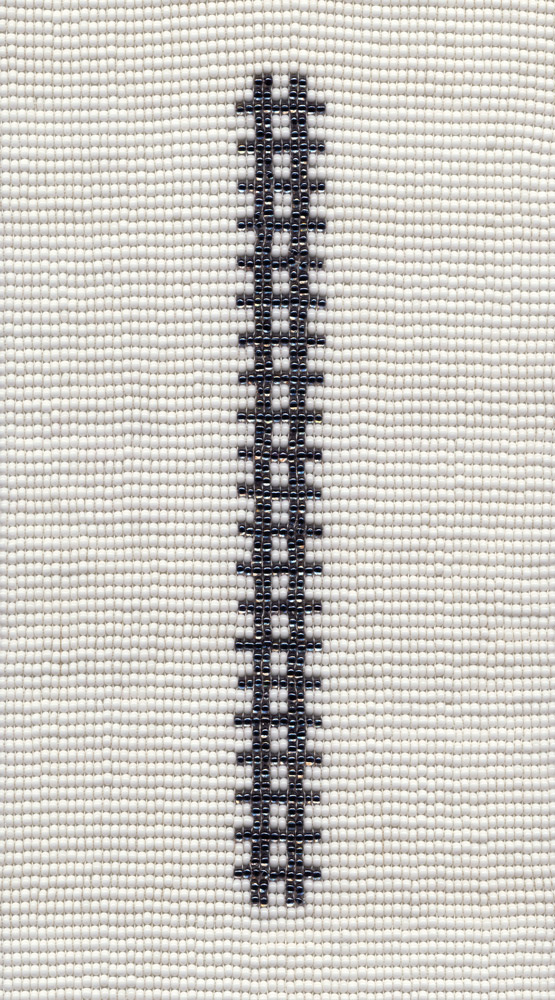

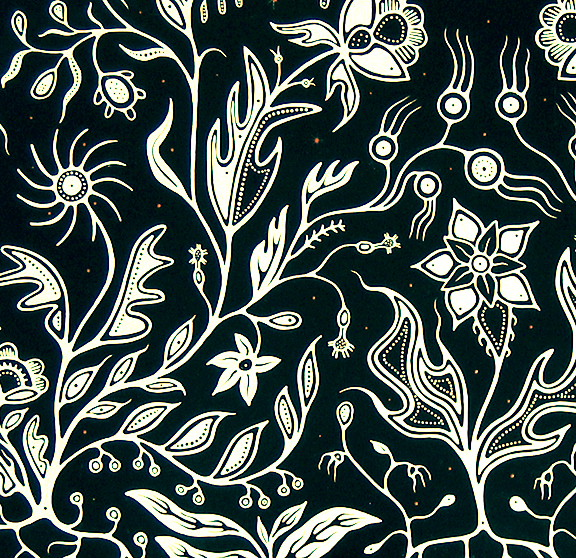 Images:
Images:
Beadwork by Nadia Myre (2 examples)
Game Over (PacMan) by Wally Dion
Untitled by Christi Belcourt
Festival Internacional de Poesía de Medellín / The 24th International Poetry Festival of Medellín starts today!
Posted: July 19, 2014 Filed under: IMAGES Comments Off on Festival Internacional de Poesía de Medellín / The 24th International Poetry Festival of Medellín starts today!
El Festival Internacional de Poesía de Medellín / The 24th International Poetry Festival of Medellín, Colombia, starts today!
.
The inaugural readings include the following poets: Juan Gregorio Regino (México), Horacio Benavides (Colombia), Oumar Farouk Sesay (Sierra Leona), Ivo Svetina (Eslovenia), Metin Cengiz (Turquía), Isztván Turczi (Hungría), Joséphine Bacon (Canadá / Nación Innu), Amin Khan (Argelia), Lou Ying (China), Gcina Mhlophe (Suráfrica), Joy Harjo (Estados Unidos / Nación Muskogee).
.
http://www.festivaldepoesiademedellin.org/es/Festival/24/index.html
The Rwanda Genocide, twenty years later: 100 Days of photographs + poems by Wangechi Mutu and Juliane Okot Bitek: Days 43 to 1
Posted: July 18, 2014 Filed under: 7 GUEST EDITORS, English, Juliane Okot Bitek | Tags: Wangechi Mutu: 100 days of photographs for The Rwanda Genocide Comments Off on The Rwanda Genocide, twenty years later: 100 Days of photographs + poems by Wangechi Mutu and Juliane Okot Bitek: Days 43 to 1
. . .
Juliane Okot Bitek
100 Days: a poetic response to Wangechi Mutu’s #Kwibuka20#100 Days
.
Day 1
I have nothing
I stand before you with nothing
I am nothing
You stand before me with nothing
I don’t know what I know
but I know that you know nothing
Having come from nothing
To nothing & from nothing
Let my nothing meet your nothing
We may find something there.
.
Day 2
This will not be a litany of remembrances:
We know who the guilty are
The guilty know themselves
This is a charge against the witnesses
& those who cannot speak
This is a charge against those who speak incompletely
& incoherently
Against nature who saw everything & did nothing
against the bodies that dissolved
& the ones that refused to dissolve
those that insisted on writing the landscape with bones
This is a charge against pain
against heartbreak
against laughter
against the dead.
.
Day 3
We were pock-marked by these things:
a torrent of accusations
bayonet sticks
lies
We were mocked
by faith in tiny shards
by the cross, with its pliant figure
representing grace
or representing the presence of God
What God in such a time?
What God afterwards?
What God ever?
Day 4
Acel ariyo adek angwen
Acel ariyo adek angwen
Acel ariyo adek angwen
Acel ariyo adek angwen
Acel ariyo adek angwen
Acel ariyo adek angwen
We have run out of days
.
Day 5
What do I remember?
Nothing but the contagion of stories
What do I want to say?
What do I want to say?
.
Day 6
Images from those days return like silent movies
The available light of the rest of this life and I
can’t hear anything
Just the silent movies
.
Day 7
Then we stumbled into the place where words go to die
& where words come from
First we bathed in it like sunbathers
then we washed ourselves in it
we rinsed our mouths out
shampooed our hair
swam in the words
& at night
we covered ourselves in words
& went to sleep
at night
the nightmares returned
but the dreams also came
.
Day 8
Justice woke up and went to work
but no one showed up
Justine, not justice, went to work
but no one showed up
Justice and not Justine
woke up and went to work
but no one showed up
women woke up and went to work
no one knows what Justine and/or
Justice are doing these days
.
Day 9
These days
circle and circle
some days soar from above like kites
others circle around and around
like hyenas waiting for the story to die
some sit
some stand on long legs
vultures wait
some stay some change seats
others come and go
some dive in
some walk, crawl, cycle
dial on the radio to listen
to stories in embers
stories aflame
stories in stories
stories stoking stories
stories stalking stories
stories in circles & circles
those stories haven’t yet killed me
.
Day 10
What indeed
constitutes
the criminalizing function
of language in media?
Stuffed
Hacked
Punched
Pumped full of bullets
Slaughtered
& left to rot on the street
Pigs
Dogs
Cockroaches
People murdered
Calculated and rated on a per hour basis
& sometimes exacted to ethnic & tribal
differences
struggles
divisions
clashes
Never people you know,
Until they are.
.
Day 11
Savage savage savage
savagesavagesavage
sa vedge sa vedge
sav edge sav edge
save edge save edge
saved saved
saved
.
Day 12
What now?
That we must create our own world
That we use the right words for the world we want to live in
Like God: Let there be light
And there was light
Let us forgive our enemies
Let us be good examples for the next generation
Let us belong to one another
Let us be friends
.
Day 13
There was a rainbow in that sky,
the day a chain-linked fence separated us.
You probably saw the rainbow in the sky;
The chain-linked fence, you probably saw it as well.
.
Day 14
Now their eyes flit flit flit,
dragonflies in the afternoon,
their hands are calm as they write
but clammy in the handshake
– what can we do for you?
– what can we do for you?
Their eyes like dragonflies,
what can they do for me?
.
Day 15
And so I am now a slow burning woman
Creeping through time like a gecko through a tree
I’m shedding skin then eating it up
Shedding skin then eating it as I crawl along
Height like time has a hazing effect
but wonder remains
exclusive to the uninitiated
.
Day 16
We were the carriers of the events
Days and nights worked in tandem
to make us forget
We carried proof of place & proof of time
We recited these details over & over
We marked our steps
We marked the cadences into a rhythm & held them close to heart.
.
Day 17
This is the horror that did not turn you into stone.
This the poem, the mirror with which you can behold
that you did not turn into stone.
This is true: you’re still not stone.
Day 18
Yesterday tripped and fell into evening
As it plunged deep into the night, voices rose up
from the abyss:
Come! Come!
They called
Come!
We never slept, trying to makes sense
whose voice was whose
Yesterday tripped and fell into a long night
of calling, of voices beckoning, recalling
things done, things undone by time
Today, I’m trying to sort out the differences
whose voice was whose
which place, what time
They all sound the same now
— the dead and the unborn;
they all sound the same.
.
Day 19
So this is what the Greek storyteller foretold:
First, the pity-inducing event,
Those poor, poor people,
Pity in the numbers, pity in the grotesque photos that followed,
the writing and the reading that followed.
There was nothing, nothing we could have done different;
Everything was beyond us.
Then came the fear it would spread like contagion,
Uncontrolled like a forest fire.
Now it is time for catharsis.
.
Day 20
It has been called a harvest of death.
It was more like a net that was cast,
A fisher net
A fisher net cast by a man
A fisher of men
– Christ, was that you?
.
Day 21
A ring around a rosie
A ring around a posy
A ring around a peony
A ring around a buttercup
A ring around a baby’s breath
A ring around a bouquet
A pocket full of posers
A pocket full of diamonds
A pocket full of memory
A pocket full of justice
A pocket full of ideas
A pocket full of shit
Ring around a rosy
A pocket full of posies
Achoo! Achoo!
We all fall down!
.
Day 22
Twenty years later we’re young again
as we should be
Welcome to this country
Welcome
Come and see how we live
Come and see how we get over everything
Come and see how we exhibit skulls
Come and see how we caress skeletons and tell stories about who these bones were
Come and see how easy we are with things;
Come and visit.
Our country is now open for tourism.
.
Day 23
Some of us fell between words
& some of us onto the sharp edges
at the end of sentences
And if we’re not impaled
we’re still falling through stories that don’t make sense
Day 24
& then there was just the two of us
everything in flames
There was the two of us
your arm around my shoulder
mine around your waist
we hobbled on
just the two of us
we hobbled on
just the two of us for a while
& then there was just me
.
Day 25
Bones lie
Bones lie
Bones lie
About their numbers and bits and parts
Bones lie in open air, in fields, under brushes, along with with others in state vaults,
in museums as if they belong there
in piles, as if they would ever do that in life.
Bones lie about being dead
bleached
broken
pulverized, as if we who are not all bone
don’t live with nightmares
Bone have nothing to say
Nothing about who it was that loved them the most
.
Day 26
That day dared to set
As did the one after it and the one after that
Days became long nights
That became mornings which appeared innocent
of the activities of the day before
That day shouldn’t have set
The next day
if that other day had collapsed from exhaustion, should have held the night sky at bay
That day should have remained fixed in perpetuity
so that we would always know it to be true
.
Day 27
Glory be to the Father to whom all this is His will
Glory be to the Son who claims to have died for the sins of all men
Glory be to the Holy Spirit that guides the tongues of flames of the believers
As it was in the beginning
As it was in the beginning
As it has always been
As long as we need to hark back to a beginning
that only exists in the memory of the elusive Trinity who can only be accessed through Faith
Nothing will ever change
Nothing will ever change except by Faith
So nothing will change
.
Day 28
When I (survey) look out at the world around me
(The wondrous cross)
On which (the Prince of Glory) every one that I loved died,
(My richest gain) My richest gain? My richest gain?
I count (but) as loss
It was all loss – all of it
And so I pour contempt on all (my) the pride
That seems to think that there is anything to celebrate.
Don’t ever forbid it, Lord,
That I should (boast) dare to speak out
(Save in) on the deaths
(of) Christ, my God, everything, everything that mattered,
All the vain things that charm (me) You most – the sky scrapers, the clean streets
& the moneyed vendors
(I) You sacrifice (them) Your own morality (to His blood)
There is nothing to party about, nothing.
See from (His head, His hands, His feet) this vantage point
Just how much sorrow and love and bone and blood flow mingling down
Did e’er such love and sorrow meet? Did ever?
Where did ever such a twisted sense of wreath-making come from?
Or why would thorns compose so rich a crown?
Can you not read the land?
Were the whole realm of nature mine
That were a present far too small
Love so amazing so divine
Demands my soul, my life, my all
So it took my soul, my life, my all.
.
Day 29
Time is a curve
so long that it seems to be a straight line
I can see myself walk away
I see
& then remember my heel striking the ground first
the weight of my shoulders
the back of my head & the low hang of my neck
Circle forward
What does my face matter if my heel is still cracked?
Day 30
A grid
a fence
a field
some grass
some stumbling
a ditch
mud
a broken slipper
a tear
a sheet
some fumbling
a groan
a metal plate with a faded rose in it
a rusty kettle that will never boil.
.
Day 31
Here: it is daytime now
We’re here
It is now twenty years after a hundred days that we did not plan on living through
We wanted to, prayed, yearned to make it
Not that those who didn’t didn’t
.
Day 32
In Eden
We heard birdsong and didn’t hear it
We saw the soft flutter & sail of a falling leaf, but we didn’t know how to read it
We worked the earth, lived off it, trampled it back and forth, back and forth
In Eden
We never thought about the difference between house and home
we never even thought to call it; we were it, it was us and ours
gang wa
Now as we fall unendingly
we know different
we understand belonging as transitory at best
& as elusive as the future we once imagined.
.
Day 33
So we mothed along towards the fire
With the full knowledge that there couldn’t be anything else beyond this
We mothed along
with bare arms, wingless
a light step here
a light step there
sometimes no step at all
& other times dreamless stops
We mothed along knowing that it was possibly death
& not fire that beckoned
.
Day 34
So we saw, tasted, smelled, touched, felt and heard what we knew to be true
We had to see, taste, smell, touch, feel and hear in order to know this word
–genocide?
How much made it valid?
Would one less death have disqualified those hundred days from being called a genocide?
And more?
.
Day 35
There’s no denying the flap of an angel’s wings
for someone who felt it fan her face in those days
The salve of a gentle touch
The stretch of an arm to catch you as you reached for the top of the wall
the strength of a wail
the depth of a moan
the light of unending days
the consistency of seasons
as real as angel wings
There is, however, a slope that leads
from these days of fiction
into nightmares that are real.
.
Day 36
Oh, I curse you.
I curse you long and hard and deep and wide
I curse you with fire from my mouth
I join everyone with fire in the mouth
Wherever we live & wherever we lay
We curse you, we curse you, we curse you.
.
Day 37
When Christ lost a beloved friend, he cried out:
Lazarus!
Lazarus, come out of the tomb
Lazarus, come out of the tomb
Imagine Christ crying for the beloved on this land:
Lazarus! Lazarus! Lazarus! Lazarus!
Lazarus, come out of the tomb!
Imagine Christ with a croaking voice:
Lazarus, Lazarus, Lazarus
Christ in a whisper
Christ mumbling:
Lazarus, Lazarus
Christ spent
Christ crumbled
Oh, Lazarus
Christ either had no idea of these one hundred days
Or he must have lost his voice in the first few moments
Christ may just have not been capable
He might have noted the endless and boundless losses of the beloved on this land
He might have hung his head down, powerless in the face of this might
Christ, look to your mother
ask her to pray for your intercession.
.
Day 38
If there’s a breeze tonight
We might think for a moment that it is sweet
There is a breeze tonight
& it is sweet
I can’t remember if the breeze was sweet in those days
There was a breeze
There might have been
Why not?
It might have been the same sweet breeze that kept us from burning
.
Day 39
If we were to go back to the time before these hundred days
We couldn’t return without knowing what was to come
How could we?
If we were to swear off, that we couldn’t return to these days
I don’t know that we could; we know
We’re marked by this knowing
We know that we’re marked
& this knowledge taints us
& so we can never absorb your innocence
But
Your innocence will not shield you from these days
Because your innocence does not cleanse
& so your innocence cannot save you from what you must know.
.
Day 40
She is my country
Every time she goes
I am a leaf in the wind
Every time she goes
She takes with her
All the home that I can ever claim
What use do I have for the carrier of bones?
What anthem can I sing for the graves of children?
She holds my home in the country that she is
& every time she returns, she is my flag
& I am home again.
.
Day 41
If justice was in a race with time
Peace would have no medal to offer
If peace sat at the table with justice
Time wouldn’t be served
If time wanted justice, so bad, so bad,
There would be nothing that peace could offer
Either by seduction or reason
.
Day 42
I kneel before you
I kneel before you but this is not an act of supplication
I kneel before you because I cannot stand
I kneel before you because I cannot speak right now
My gestures are wordless articulations
& the dark in my eyes is not an indication of anything you could imagine
& there is nothing, nothing that you could ever give me
Day 43
After all the madness,
& it had to have been a madness,
You hear the arguments and explanations
That it was inevitable
That it was coming
That it had to happen after all those years
Knowing what we know now
What else should we have expected?
I hear that my loss was inevitable
I hear that my loss was coming
I hear that my heartbreak was written in the stars
& in historical documents & even in the oral stories
We had to have been blind & deaf & dumb to not have known
We had to have been oblivious, thinking that we could live
to a full life of family and community like others
After all, who misses the inevitability of a mass event like a genocide?
. . .
To see / read Days 100 to 44, click on the ZP link below:
https://zocalopoets.com/2014/05/31/the-rwanda-genocide-twenty-years-later-100-days-of-photographs-poems-by-wangechi-mutu-and-juliane-okot-bitek-4/
. . . . .
Alexander Best: La Cara del Girasol
Posted: July 16, 2014 Filed under: Alexander Best, Spanish Comments Off on Alexander Best: La Cara del GirasolGirasol – en el alba, mediodía, anochecer –
¿por qué – para mí – tienes tan poder?
Tú: mi cara alegre cuando me abro al gozo
(y no soy el juguete de la ira);
cuando estoy franco con sentimiento,
(no tambaleándome por dentro).
Sólo ve y hazlo, asientes; haz lo posible, asientes,
y tus compañeros me dicen: si puedes soñarlo, puedes hacerlo.
Eres ávido, sincero, directo, auténtico
– ¿y puedes advinar por qué te amo tanto?
Es que: crece mi ánimo
cuando nos paramos cara a cara
– pues puedo reunirme con la raza humana.
Dylan Thomas: Poema del Ocaso del Día por El Reverendo Eli Jenkins / The Sunset Poem of The Reverend Eli Jenkins
Posted: July 15, 2014 Filed under: Dylan Thomas, English, Spanish, ZP Translator: Alexander Best Comments Off on Dylan Thomas: Poema del Ocaso del Día por El Reverendo Eli Jenkins / The Sunset Poem of The Reverend Eli JenkinsBajo el bosque de leche es una pieza de radioteatro del escritor galés, Dylan Thomas, posteriormente adaptada para su representación en el teatro. También existe una adaptación cinematográfica de 1972, con Richard Burton y Elizabeth Taylor.
En Bajo el bosque de leche, un narrador omnisciente invita a los oyentes a escuchar los sueños y pensamientos íntimos de los habitantes de una imaginaria localidad galesa, “Llareggub” (inversión de bugger all, traducible aproximadamente como “iros todos al carajo”). Entre los personajes principales, cuyos nombres son casi siempre simbólicos, se encuentran el Capitán Cat, que revive su época de marino; las dos señoras Dai Breads; Organ Morgan, obsesionado con su música; y Polly Garter, que suspira por su amante muerto. Tras este inicio onírico, el pueblo despierta y cada personaje se sumerge en sus quehaceres cotidianos. (Wikipedia)
. . .
Dylan Thomas first wrote Under Milk Wood as a radio drama in 1954. It was later adapted as a stage play. In the story a narrator invites the listener to hear about the dreams and hidden thoughts of the inhabitants of a Welsh fishing village called Llareggub (“bugger all” spelt backwards). The characters include: Mrs. Ogmore-Pritchard, who nags her two deceased husbands; Captain Cat, who relives his seafaring years; the Mrs. Dai Breads; “Organ Morgan”, obsessed by music; and Polly Garter, who pines for her dead lover. Toward the end, the town “awakens”, and is aware now just how their feelings affect all that they do. And so, they go about their daily business…
The following poem by Thomas is taken from the radio play:
The Sunset Poem of The Reverend Eli Jenkins
.
Every morning when I wake,
Dear Lord, a little prayer I make;
O please to keep Thy loving eye
On all poor creatures born to die.
And every evening at sun-down
I ask a blessing on the town;
For whether we last the night or no
I’m sure is always touch-and-go.
We are not wholly bad or good
Who live our lives Under Milk Wood;
And Thou, I know, wilt be the first
To see our best side – not our worst.
O let us see another day…
Bless us all this night, I pray;
And to the sun we all will bow,
And say good-bye – but just for now.
. . .
Dylan Thomas
Poema del Ocaso del Día (por El Reverendo Eli Jenkins)
.
Cada alba cuando me levanto,
Querido Dios, una pequeña oración hago.
Por favor, que apuntes el ojo de tierno cuidado
Sobre todos nosotros – las pobres criaturas destinado a morir.
.
Y en la tarde, a la puesta del sol,
Te pido una bendición por el bien del pueblo,
Porque – en esta noche – y si duramos o no –
Yo sé que la Vida siempre es precario.
.
Buenos, malos – no somos ni el uno ni el otro
(nosotros viviendo en en el pueblo de Bajo-Leche-Madera);
Y – lo sé – que Tú serás el primero que ve en nosotros lo mejor – no lo peor.
.
¡Ah, miremos un otro día!
Bendícenos en esta noche – rezamos;
Y haremos una reverencia al sol,
Y digamos Adiós – a menos por ahora…
. . .
The Sunset Poem was also set to the music of A. H. D. Troyte (Troyte’s Chant No. 1), in four-part harmony for two tenors and two bass singers.
. . . . .






